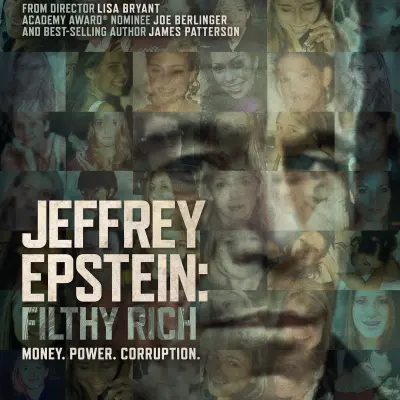Netflix's Jeffrey Epstein: Filthy Rich docuseries often plays like a long, fancier episode of Dateline
-

In Lisa Bryant’s four-part Netflix docuseries, the urgency of Jeffrey Epstein's crimes "gives way to long stretches of recapping, becoming less-than-riveting stuff," says Hank Stuever. "Nauseating, sure. But in the three episodes provided for this review, there’s never a unifying theme or reason that helps a viewer understand why the Epstein saga still merits four hours of our undivided attention. Filthy Rich often plays like a longer, fancier episode of NBC’s Dateline, in which facts that are mostly already known are recounted by victims, investigators, attorneys and journalists ... and then arranged in the most logical manner, with an emphasis on the sex crimes and the courage of victims who are speaking out. It’s possible that fresh findings await in that fourth hour; if so, the price of admission is to endure the first three. Has Bryant perhaps located the still-hiding Ghislaine Maxwell, Epstein’s longtime girlfriend and associate, whom victims say helped procure young girls and women for him? Then by all means, reveal it. Even a nation restricted to Netflix for excitement has a limit to how long it can sit and watch."
ALSO:
- Filthy Rich isn't really about Jeffrey Epstein -- it's about the traumatized and grief-stricken lives he left behind: "Where the documentary shines is in its portraits of the survivors," says Lili Loofbourow. "(These are sometimes literal: The last installment of the documentary has one of Epstein’s earlier targets, Maria Farmer, an artist, presenting portraits she’s painted of each of the women.) This has been a complex case to follow ever since November 2018, when Julie K. Brown brought Epstein back to national prominence with her indefatigable reporting for the Miami Herald. It has only gotten more complicated since, as more women have come forward, and as more stories have emerged. There are enough victims at this point that it’s hard to keep them all straight. The documentary, by its nature, dispenses with that difficulty: There’s no confusing Michelle Licata and Maria Farmer once you’ve seen them on camera. The survivors’ stories stack up, reinforcing one another and building out a larger narrative about collective damage."
- Filthy Rich lets the survivors speak, but frustratingly doesn't know what to do with these narratives: "It's obviously imperative that in any telling of Epstein's story these accounts be centered, but it's a move that, in the hands of director Lisa Bryant, is more successful in theory than in practice for the purposes of a docuseries," says Ashlie D. Stevens. The pacing of Filthy Rich starts and sputters, occasionally ramping up into high gear when we hear from the detectives who worked the case. But there's no investigation to further most details that emerged prior to and following Epstein's death by suicide in 2019, no real reflection on why Epstein was so readily embraced by the financial and political elite. Instead, Filthy Rich often slips into a kind of nauseating rhythm of victims recounting horrific abuse, present-day interviews with the prosecution and the defense in the Epstein trials, and quick cuts to insights from journalists, law enforcement, and adolescent sexual psychologists. Think of it, almost, as an especially plodding four-hour edition of Dateline."
- The big question is why Filthy Rich is allowed to accuse some people, and not others: "Why are there myriad specific accusations against Epstein 'companion' Ghislaine Maxwell, but a group of women accused in nebulous terms of procurement are never discussed in real detail and don't even provide statements?" asks Daniel Fienberg. "Why is only one former Epstein employee here from the notorious 'Pedophile Island' (or other properties where servants were plentiful, but documentary participation is absent) and what governed what he was able to discuss? What allowed Donald Trump, Bill Clinton, Prince Andrew and Harvey Weinstein to be named as representative high-rollers in Epstein's sphere, but only in very limited contexts and with limited implications of criminality? I'm not in any way accusing the filmmakers of a dereliction of duty; I'm pointing out the accommodations that had to be made in order to tell this story at this moment, and the limitations to what Filthy Rich is able to do as a docuseries."
- Filthy Rich isn't a deep probe of the Epstein case: "It’s a piece that exists to confirm and to amplify what the casual news consumer ambiently knows about Epstein’s story, rather than to seed throughout deep analysis about what the case can teach us," says Daniel D'Addario. "There’s little, here, to be interpreted; what’s put before the viewer is meant simply to be taken in. The testimony of various women whose lives Epstein’s assaults ruined is grim. Their descriptions of his acts against them — better left for the documentary itself, so that readers can experience them in context — is made yet more troubling by further discussion of self-images ruined, futures consumed by guilt and grief."
- Here are Filthy Rich's nine most shocking revelations
TOPICS: Jeffrey Epstein: Filthy Rich, Netflix, Jeffrey Epstein, Lisa Bryant, Documentaries
More Jeffrey Epstein: Filthy Rich on Primetimer:- Netflix countersues Alan Dershowitz over Jeffrey Epstein: Filthy Rich
- Alan Dershowitz is seeking $80 million in damages in a lawsuit against Netflix over Jeffrey Epstein: Filthy Rich
- Jeffrey Epstein: Filthy Rich director reacts to Ghislaine Maxwell's arrest
- Alan Dershowitz says he'll sue Netflix over Jeffrey Epstein: Filthy Rich
